 BOOKS
BOOKS
The titles presented here in reverse chronological order are either in print or available from the author:
lvc lesleychamberlain.co.uk
lesleychamberlain.co.uk
2006
 The Philosophy Steamer Lenin and the Exile of the Intelligentsia
The Philosophy Steamer Lenin and the Exile of the Intelligentsia
(Atlantic Books)
ISBN: 1 84354 040 1
In September 1922 Russia expelled around seventy philosophers, academics, journalists and others considered unlikely ever to come round to a Marxist-Leninist point of view. Lenin, who founded the Soviet Union three months later, initiated the campaign and chose many of the names on the list himself. This book recounts, for the first time in English, the story of these men who were deported for their anti-Communist attitudes and what happened to them when they made new lives in Berlin, Prague and Paris. This historic event, which, including family members, forcibly deprived more than 200 Russians of their homeland, takes its name from the religious philosophers, who were Lenin’s most prominent victims. The Philosophy Steamer, which contains rare photographs from police and family archives, concludes by asking what this event meant in the history of ideas. Why should ‘reason’, the cause Lenin espoused, have wanted to banish religion, just as the twentieth century got underway?
Lesley Chamberlain writes: ‘I’d known about this untold story for some years, then one day it struck me that I’d known personally one of the expelled Russians on the boat. His name was Victor Frank and he was 13 years old at the time. Filling in the story of his life took me back to my time as a student of Russian when I arrived in Germany with a letter of introduction to Frank, who had become an eminent broadcaster.
The Philosophy Steamer is a companion volume to Motherland (2004), which spelled out the ideas Lenin forced underground in the Soviet period. The Philosophy Steamer tells the true story of the lives and fates of the men who had the wrong thoughts.’
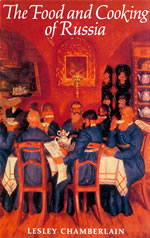 The Food and Cooking of Russia
The Food and Cooking of Russia
- reprinted with a new introduction by the author
(Bison Press, University of Nebraska )
ISBN: 0803264615
This pioneering cookbook, when it first appeared, recorded the author’s experience of the people, their culture and their history, at a time when Russia was a politically closed country behind the Iron Curtain. With practical instructions and background history on more than two hundred recipes, from blini to cabbage soup, Russian Easter Cake to ‘Russian salad’, this book revealed how everyday life continued despite political repression. Russian food was a rich subject for the thinking cook to explore. Since its first publication in 1982, when one critic said’ I read it like a novel’, this fine collection of recipes has become a classic. The new edition contains period illustrations and a new introduction by the author.
Lesley Chamberlain writes: ‘I lived in Soviet Russia for just over a year, 1978-9, at the height of the Cold War. Working as a foreign correspondent, I planned to do my research on two subjects – food and philosophy - in my spare time. In practice my work as a Cold War messenger between the Kremlin and the White House left few free hours, but many of those were spent shopping in the Georgian Market near Reuters’ Moscow office to try out recipes I’d found while browsing through early nineteenth-century cookery books in the Lenin Library. This was my first book and it made me realise what a useful indicator of a society’s pretentions, problems and preferences food was. The philosophy would have to wait until many years later.’
From the Reviews of the 1982 edition:
The first really good book on this fascinating subject …It is the first on its subject to take account of post-Revolutionary changes in Russian eating habits…It is also the first book I know that is written by a Russian-speaking non-Russian. Most books on Russian food are the work of nostalgia-inspired émigrés whose memories of the food…sometimes impart un unwarranted rosy colour to Grandmother’s borshch. One of the greatest virtues of Mrs Chamberlain’s book, which I read from cover to cover as one would a novel, is the great attention she pays to the culinary regions of the Soviet Union…I am prepared to believe her when she says, “Georgia has been most influential in improving the standards of Soviet Russian cooking, and has taken the place France used to occupy”.
Paul Levy, The Observer
Her disposition to examine cookery in relation to political philosophy and history…is reflected in many parts of her book; woven together with pleasing literary quotations and allusions, it turns what would have anyway been a good cookery book into something more. Those who like to keep the books of Elizabeth David and Jane Grigson by their bedsides as well as in their kitchens will appreciate its discursiveness.
Alan Davidson, The Times Literary Supplement
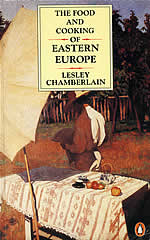 The Food and Cooking of Eastern Europe
The Food and Cooking of Eastern Europe
reprinted with a new introduction by the author
Bison Press University of Nebraska
ISBN: 0803264607
The Food and Cooking of Eastern Europe, when it was first published in 1989, surveyed the rich and diverse food of cultures known to few people in the West during the half a century when Europe was divided. A companion volume to The Food and Cooking of Russia, it contained more than two hundred practical recipes interwoven with historical background and notes. Readers could rediscover classics such as Hungarian gulyas and Polish barszcz in their original setting, and savour new delights such as Fugger’s Lemon Cake and wonderful vegetable recipes from the Balkans. Now, in a quite different political world, this book is a vital resource for remembering life before the Iron Curtain was lifted.
Lesley Chamberlain writes: ‘Much of the background material for this book came from my extensive travels in Central and Eastern Europe 1978-89. I had the interest in food that was established by my first book and I wanted to understand the Communist world: the two interests naturally fused.’
From the Reviews of the 1989 edition:
Lesley Chamberlain’s …magisterial Food and Cooking of Eastern Europe
Nigella Lawson, The Spectator
An excellent introduction to the cuisine of the lands of gulyas, dumplings and strudel.
Steven Beller, The Times Literary Supplement
The Food and Cooking of Eastern Europe is a tour-de-force of cuisines which often overlap but which have the same sturdy independence of spirit as the peoples who gave them birth.
Robert Heller, High Life
2004
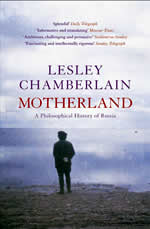 Motherland A Philosophical History of Russia
Motherland A Philosophical History of Russia
(Atlantic Books)
ISBN: 1843542862
Russia is normally considered to have a highly distinct tradition in social and political thought but precious little philosophy. This book, which begins by outlining the familiar history of revolutionary ideas, challenges that view in a series of original essays. It traces a two-hundred-year preoccupation with ‘the good man in Russia’, spells out a love-hate relationship with the benefits of reason, and explains ‘the mystical turn’ which inclined Russia’s most characteristic philosophers to ground their thinking in a quasi-medieval religious outlook. A separate chapter looks at Lenin’s claims to be a ‘philosopher’ and where they led. The final section of the book attempts to show how ‘the long tradition’ survived the Soviet period partly by disappearing ‘underground’ and partly by becoming absorbed in the practice of Russian Communism, as distinct from what the letter of Marx, and of the Party, laid down.
Lesley Chamberlain writes: ‘This was a difficult book to write, because “Russian Philosophy” is a notoriously unsystematic and elusive subject. The unfamiliarity of even the main players to non-Russian readers prompted an introductory section on the revolutionary thinkers to serve as a time-line and a map. The best of the philosophical tradition seemed to me summed up in the idea of ‘The Good Man in Russia’, while the greatest Russian weakness was the aversion to reason, which left the intellectual life without an objective standard of judgement. One of the best questions I’ve been asked is how this Russian tradition relates to classical Western philosophy. The answer is that it has very little classical about it, if you think of modern Western philosophy developing out of Descartes. Where it does have an affinity, however, is at either end of the historical spectrum: with Plato in ancient times and postmodernism now. The characteristic position of Russian philosophy is ‘idealist’ at the same time as it is despairing of suitable modern answers. Dostoevsky sets the tone for thinkers who are more inclined to explore their ideas in novels than set them out systematically.’
From the Reviews:
Lesley Chamberlain, a distinguished English kruzhkovaya [Russian-style] philosopher, is concerned to redeem some philosophical value from the past two centuries of Russian history, which she describes, in a characteristic paradox, as “an intellectual disaster but not an imaginative or a moral failure”. Her book, with its impressive range of intellectual sympathy and understanding, is an intrepid non-Russian contribution to the familiar quest for a “Russian truth”, for some key, in philosophy, to “the mystery of that country and culture”.... Chamberlain tries to explore Russian philosophy neither as the passive victim of political repression, nor solely as the origin and motor of a ruinous totalitarian ideology, but as “a story of hope and belief” with its own internal impulses, achievements and pathos.’ Rachel Polonsky
The Times Literary Supplement
One of Chamberlain’s main aims is to show that a conception of philosophy as an essentially moral enterprise is peculiarly Russian. More interestingly and ambitiously still, she argues that this “poetic crusade to save life from cogitation” is the key to understanding Russia itself, and to unlocking the mystery of a ”culture without reason”…Pointillist rather than teleological, her strategy is to assemble fragments of a “virtual jigsaw” in order to give a picture of the Russian moral and philosophical landscape in the nineteenth and twentieth centuries that is impressively variegated…
The pages she devotes to Lenin’s pseudo-philosophy… are among the sharpest and most keenly felt in the book She memorably describes this jejune stew of poorly digested epistemology as… a “shallow, improper book” in which Lenin was “deliberately simplifying Russia” – specifically Russia’s sense of itself as a moral quest.
Jonathan Derbyshire, Daily Telegraph
Motherland is a valiant, fascinating, and intellectually rigorous attempt to make sense of an extremely difficult subject…The implications of this analysis are, however, surprising. Lesley Chamberlain appears to believe that the collapse of the Soviet Union might have brought about the collapse of this philosophical tradition, as “individualism, selfishness, atheism, competition, prosperity” have burst into what was an hermetic society. It would be odd, however, if a system which has withstood communism cannot withstand capitalism. And in the end one wonders whether her interpretation does not tilt the balance too far against a more traditional view.
T.J. Binyon, The Sunday Telegraph
This is an ambitious, challenging and persuasive volume. Chamberlain charts how 19th-century Russian intellectuals wrestled with scepticism, individuality and the nature of goodness in a way that made the eventual triumph of Soviet dialectical materialism close to inevitable. She excavates whole generations of thinkers in a compelling manner, and is particularly good on the interplay between anarchism and religion in figures such as Berdyaev and Bakhtin.
Scotland on Sunday
‘Her forte is drawing subtle connections between widely different thinkers….yet the real vice of Motherland is a kind of intellectual over-subtlety or dandyism. Just imagine a biography of Tolstoy written by Milan Kundera. …Motherland is a clever, civilised, but ultimately somewhat inconsequential book
Edward Skidelsky, The New Statesman
With echoes of Simon Sebag Montefiore and Orlando Figes intertwined in her narrative, Chamberlain tells the story of over 200 years of Russian thinking…this intelligent assessment of the great Russian minds will provide readers with an unparalleled insight into Russia’s spirit.
Good Book Guide
The magazine Philosophy Now (www.philosophynow.org ) Issue No 54 Feb-March 2006 carries an extensive interview with Lesley Chamberlain in a special edition dedicated to Russian philosophy.
2003
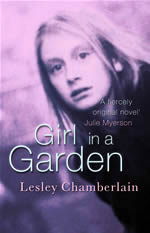 Girl in a Garden A Novel
Girl in a Garden A Novel
(Atlantic Books 2003)
ISBN:1843541033
Linka Beecham, an imaginative and somewhat troubled ten-year-old, finds an escape from parental tensions by constructing her ideal life in fields behind the family home. Her view of the world is coloured by a fascination with words and sounds, and nature, and an eccentric friendship with a Polish refugee living in the same street. The wartime memories of the adults around her, and the events of the year in which the novel is set, 1961, tinge the events of a wild summer spent in the open air with some of the more sinister currents of recent European history.This is a coming-of-age English novel with a European dimension.
Lesley Chamberlain writes: ‘First novels tend to reflect their authors’ own lives, and it would be silly to pretend there’s nothing of mine in Girl in a Garden. But it’s worth remembering that a novel is not an autobiography and there are reasons why the material of experience cries out to be supplemented, reshaped and ultimately transformed into a new story. “Europe” seems to me the key to why this novel had to exist as one of the corner-stones of my writing. In all my work, even in the writing about food, I’m interested in where history and people’s personal lives intersect. In one respect I set out in Girl in a Garden to invent the kind of childhood I might have had, if I wanted to explain my adult interests coherently. But real life is not so coherent. The title is both random and general, like the subject of a painting. It’s not “the” girl, nor is she in “the” garden”.’
From the Reviews:
This first novel is a low-key story with hidden depths…”People thought of beauty often,” says Linka, looking back on her childhood. “They thought of people leading beautiful lives because there had been so much ugliness.” It is a measure of this deft, understated novel that the yearning for beauty, so redolent of the period [the novel is set in summer 1961], shines fitfully through, however banal or disappointing the reality.
David Robson, The Sunday Telegraph
Like the nomadic Henryk, the narrative wants to live “in an eternal present”, and only on the final pages does Linka supply an elliptical summary of her life after childhood, and her own, unspecified experience of misfortune – the lightest of touches in a novel of light touches, it is a sudden, heart-breaking conclusion to a memorable first novel.
Stephen Knight, The Times Literary Supplement
Lesley Chamberlain has done a brilliant, delicate job with this vivid novel set in the post-war atmosphere of 1961.
Daily Mail
The Macmillan era ideal of central heating, picture windows and beans-on-toast for tea is a fragile vessel for the savage passions of unstable, deracinated people…the truce between nature and civilisation is written in the sand.
Charlotte Moore, Evening Standard
Chamberlain writes with such clarity and understanding about human pain that she effortlessly reaches the hidden child in all of us.
Lucy Beresford, The Literary Review
A convincingly dark meditation childhood.
Hephizah Anderson, The Observer
2000
 The Secret Artist A Close Reading of Sigmund Freud
The Secret Artist A Close Reading of Sigmund Freud
(Quartet)
UK ISBN: 0704381478
US ISBN: 1583225773, Seven Stories 2003
Freud has come under enormous criticism in the last 25 years for being ‘unscientific’. This book, which upholds Freud’s right to be considered one of the great and most formative thinkers of the twentieth century, argues that Freud’s own claims to be doing ‘science’ have misled commentators into thinking his reputation stands or falls with proof of the clinical validity of psychoanalysis. Essentially Freud had the mentality of a writer trying to communicate his experience of the world in a form the reader would find inviting. At the same time that form, the science of psychoanalysis, would protect him from claims that he was being subjective. The Secret Artist turns the obsession in Freud’s oeuvre with concealment and revelation into a way of reading his work as a quasi-literary text, concealing and revealing the author behind it.
Lesley Chamberlain writes: ‘I began this book mindful of the very close links between Nietzsche, to whom I had already dedicated Nietzsche in Turin, and Freud. The crucial affinity was their very modern feeling that self-knowledge, for so long the goal of the humanist Western tradition, was barely possible, and that what replaced it was a series of poses and masks and tricks which people often unconsciously engaged in. It was this insight which really gave birth to literary modernism, and I wanted to show that Freud belonged as centrally to that tradition as Nietzsche did. But The Secret Artist also had a special meaning for me in that I wanted to explore how Freud, in his many moments of self-examination, understood the impulse to get away from the facts and seek the emotional truth of invented “stories”. Each of us constructs fables in his or her own head, to account for our characters and our lives. Freud was not only the first to recognise this fact from a medical point of view, but also the first to find a way of talking about it, and using it as a means of self-confrontation and therapy. I don’t think he was a great writer in the sense that, for instance, Tolstoy was. I ascribe to him some very Freudian complexes such as “pen envy”, or the desire to be a writer, and a neurotic desire to hide behind the mask of “science”, in order to sort out the deeper problems of his life. But I think he had an extraordinary imagination which he poured into the creation of a theory about human nature which changed the way we understand each other. Those who denigrate Freud, apart from revealing their own insecurities, forget where the irony, generosity and humour with which we treat each other’s weaknesses and oddities these days came from. They were the result of the huge impact of psychoanalysis on Western culture from the earliest days of the twentieth century.’
From the Reviews:
Lesley Chamberlain’s effort to rehabilitate Freud by recognising him as a potential artist rather than a scientist is learned, perceptive, beautifully written and intellectually stimulating…Much of what Freud wrote was fiction derived from autobiography: but it is fiction which illuminates human nature as powerfully as does the fiction of Proust and Kafka.
Anthony Storr, The Literary Review
Chamberlain takes Freud’s real enterprise to be autobiographical. All his books, from The Interpretation of Dreams right through to late works such as Civilisation and Its Discontents form not so much what [Frederick] Crews sees as a “multivolume fictional opus” but a poetically charged account of Freud’s own self in all its obsessiveness, ambition, insecurity, rage and, of course, genius…Chamberlain clearly recognises Freud’s covertly expressed “antagonism towards the received authority of high art and the respectability of its practitioners”…There is detectable everywhere in Freud’s writing the furious resentment – albeit strictly controlled – of the failed artist. On the few occasions when, as in the case of Leonardo, for instance, he directly considers the psyche of a maker of great art, he as good as confesses his bafflement in the face of the mystery of creativity. Really, he does not know how the trick is worked…The hunger to be an artist, allied with the inability to create real art or even to understand intimately how it is made by others, was a lash that drove Freud’s ambition, his determination to be recognised as a Great Man.
John Banville, The Irish Times
“Why can’t there be more real and fulfilled love?” The strength of this book is that the author see this question hovering behind the couch. Freud said that there can’t be more satisfaction, let alone happiness, in the world because we make ourselves miserable and because we have created a society that is very good at making us even more miserable…Though hotly contested, Freudian thinking informs the ways we perceive ourselves and our society, and it remains relevant to how some of our most pressing concerns (from drug abuse and aggression to gender and sexuality) are addressed…Of course, it is entirely possible that constructing a meaningful account of how we have come to be who we are will not always seem important to a culture bent on “coaching” its way into a successful future…But if we continue to consider the past important for giving meaning and direction to our lives, it’s a good bet we will find ourselves going back to the old man to tell our tales and construct our histories.
Michael S. Roth, Los Angeles Times Book Review
The starting-point of Lesley Chamberlain’s stimulating book is an oddity in Freud’s career…that he took up science…A strange, powerful figure, both authoritarian and anarchic, with an intuitive, artistic faculty moving restlessly in ways opaque even to himself – that is the Freud presented in The Secret Artist. Freud’s scientific ideal is seen here as a subtle form of self-deception, or as Lesley Chamberlain puts it, the “neurotic hiding-place” which disguised from himself his real gift for imaginative art. He was a kind of novelist working with real lives…Chamberlain’s book testifies to the fascination Freud continues to exercise once we are free of both hagiography and of idol-bashing.
Ritchie Robertson, The Times Literary Supplement
 In a Place Like That
In a Place Like That
(Quartet)
ISBN: 0 7043 8070 6
This book is a series of short stories about characters from ‘East’ and ‘West’ encountering each other in the old days of the Cold War. The Western characters tend to be journalists or travellers or academics – the sort of people whose work took them behind the Iron Curtain, into a realm of existence that cast doubt on the values and certainties of the world they came from. The ‘Eastern’ characters in most of the stories live in a country called Bezzakonia, ‘a No-Rule-Place’ of moral confusion and absurdity. Both sides yearn for each other with an at times erotic intensity, because ‘over there’, ‘on the other side’, ‘with a different way of doing things’ holds out the hope of change and even the promise of happiness. In the last few stories, some of which describe different stages in the same characters’ lives, Russia owns up to its true Bezzakonian name and comes out of the cold, as the first de-Sovietized Russians make their now legitimate way West, to comic and confusing effect, because the way to happiness is not so obvious.
Lesley Chamberlain writes: ‘I was always fascinated by the sense of the “otherness” of “the other side” the Cold War years, and the idea that Europe’s division meant that East and West could see into each other as if into a mirror. It was a mirror which invited self-questioning, and I was particularly interested in characters and situations likely to lead the reader to moral conclusions at odds with the prevailing political wisdom. I always found distasteful the idea that the collapse of Communism was a great moral victory for the West. It wasn’t. It was a political and economic victory, since when many of the countries on both sides, the unquestionable benefits of personal liberty apart, have been in a muddle about who they are. At the same time with my invention of Bezzakonia I wanted to create stories which might later reproduce, for generations that never knew it first-hand, what the Soviet Communist world felt and smelt and tasted like. This was one of the reasons for using a fictitious name for a country that was largely based on Russia, but equally exuded the atmosphere of other countries in the bloc like Czechoslovakia and Poland.’
From the Reviews:
As a veteran of both Bezzakonia and the New Russia, I found this book immensely absorbing, as though it had been written just for me, Fellow veterans will immediately recall what it felt like to stand in a queue in order to buy a kilo of tomatoes, to be admitted to a Russian’s flat, or to emerge triumphant from a clash with some petty official. Perhaps they too seek in vain, like Alice, for the way back into that frustrating and insane, but enticing Wonderland, experiencing a sense of loss when the key can no longer be located. Lesley Chamberlain’s brilliant book is a touching and humorous requiem to a lost world.
Lindsay Hughes, Times Literary Supplement
Lesley Chamberlain’s great love for Russia has led her to acquire a Russian sensibility, and some of her episodes have the economy and sense of humour of Mikhail Zoshchenko. She is a wonderfully observant writer, constantly noticing little things. She writes of the fad for wearing T-shirts with meaningless foreign slogans on them; she remembers with nostalgia the grey horror of a refectory meal…Love or hate them, such experiences are not easily forgotten – and were well worth recalling. Chamberlain’s atmospheric fictions are a delightfully revisionist reminder of what the Cold War was really like for the footsoldiers in the front line.
Richard Gott, The Independent
1996
Nietzsche in Turin
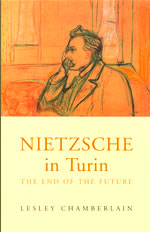 UK (Quartet)
UK (Quartet)
ISBN: 0704380285
US (Picador, 1997)
ISBN: 0312181450
An association with the ideology of Hitler’s Germany, through the idea of the ‘Superman’, blighted the reputation of Nietzsche after the war, despite the efforts of the outstanding American scholar Walter Kaufmann to clarify the picture and despite new translations, most notably by R.J. Hollingdale, of the major texts. Nietzsche in Turin tried to remedy the situation by presenting Nietzsche as a human being. The book, which embraced the author’s fresh reading of the German texts and her travels in Nietzsche’s footsteps, traced the last ten months of Nietzsche’s sane life, from when he arrived in the north Italian city in April 1888 to the first days of January 1889, when he collapsed with a paralysis of the brain diagnosed as syphilis. Lesley Chamberlain used that extraordinary year, with its flurry of great work, as a springboard to examine Nietzsche’s whole life and career. Nietzsche in Turin provided what one critic called ‘uncanny insight’ into the mind of a great philosopher in crisis. The style of the book, in ‘prose…complex, free associative and richly allusive’, added to the impression that never before had the reader come so close also to Nietzsche the man.
Lesley Chamberlain writes: ‘A chance visit to Turin led to my passing a few spare hours in that impressive Baroque city, in a leafy square, reading Nietzsche’s letters from his stay in 1888. His voice there was so immediate and compelling that I straightaway decided to make his correspondence with friends the focus of a book. The project then took its own course. I felt a great affinity with Nietzsche at that time, and returning to his work in German took me back to some of the most satisfying years of my life, when I studied German literature. It wasn’t an easy book to sell, and many eminent publishers turned it down. I was lucky to find a small publisher willing to take the risk.’
From the Reviews:
Once in a while a book presents itself to one’s attention in the most unassuming way and then turns into a major intellectual event. Such was my experience of Nietzsche in Turin by Lesley Chamberlain. Chamberlain is neither a philosopher nor an academic, but she is a linguist, a thinker, and that rarest of things, a sympathetic reader. Nietzsche needed a woman’s touch, both metaphorically and in life, and here he gets it, if belatedly. This is simply the best book I have read in a very long time on the greatest philosopher of the modern age (philosopher or artist? – the question is pertinent and Chamberlain addresses it with subtlety and rigour).
John Banville, The Irish Times
This brilliant book should be a great relief for anyone condemned to read the run of contemporary Nietzsche commentaries; and for anyone who isn’t, it could be an introduction which is hard to imagine being surpassed in passion and lucidity.
Michael Tanner, The Times
1995
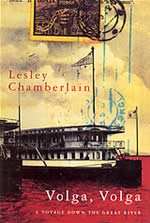 Volga Volga A Journey Down the Great River
Volga Volga A Journey Down the Great River
(Picador)
ISBN: 0330333453
In the summer of 1993, just a year and a half after the collapse of the Soviet Union, the author travelled the length of the river Volga and back, from its fabricated origins in Moscow, via the canal Stalin built with forced labour, east through the heart of provincial Russia and south to the river’s mouth in the Caspian Sea. She travelled with her bodyguard-companion, the Russian writer Aleksei Slapovsky, and kept a daily log of their conversations and adventures as two river steamers in succession took them from Nizhny Novogorod to Kazan’, to Lenin’s birthplace in Simbirsk and Tolstoy’s in Samara, to the scene of the extraordinary wartime battle of Stalingrad, and thence down the serene lower reaches of a river famous for its sturgeon and the caviare farmed on the shores of the Caspian. Part travelogue, part guide to the history and sights of regions of Russia where for seventy years Western tourists had not been allowed, Volga Volga was also a record of how the great upheaval of 1991 caught provincial Russia unprepared for a more Western style of life.
Lesley Chamberlain writes: ‘I was away for six weeks that summer and the experience consolidated my ambivalent feelings for Russia. It always seemed to me a country and a culture I could explain, not least because I spoke the language well at the time, and because I was deeply sympathetic to the sufferings of people I met, and moved by the troubled course of Russian history. But there was also a destructive, anarchic side to the experience of Russia which led me to despair. Indeed, by the end of my voyage, I felt that here was a country which was great by virtue of its art, but that it had only its art to hold on to. To some it may seem as if this book was written in a different epoch from the present-day, that time has moved on swiftly since the change. But the steady stream of letters I have received from visitors to Russia ever since has persuaded me that much of what I observed about the country, on that slow-moving river, was equally slow-moving, if not timeless.’
From the Reviews:
Lesley Chamberlain’s engrossing account of her journey down the Volga does not simply describe her colourful personal encounter with Russia’s mythic waterway and the people who depend upon it: Volga Volga also provides a lucid historical explanation of the river and its decline, and an insightful evocation of the culture of which it is part…A bleak vision indeed, but a book well worth reading.
‘Paperbacks’ in The Times
Chamberlain’s travel writing is learned and meditative…part-lecture, part-romance, this book unearths a complex country, one whose “tragedy is uniquely eloquent”.
The Observer
Chamberlain’s prose is spare, at times jerky, but her voice is always original. Combining journalistic skills with careful research and imaginative flair, she extracts the condition of post-Communist Russia from the shell of everyday experience and detects the historical and cultural resonances of the Volga lands…Most importantly, the author never loses sight of the fact that her views of Russia are glimpsed through the veil of Western culture. I was relieved, after a spate of “Russians are just like us” books since 1991, to read one which acknowledged and explored the differences…Free too of the opposing baggage of Slavophilia, she despairs frankly of the lack of public honesty, the constant shifting of goalposts, conceptual trickery and the “historically unhinged” quality of the country. The result is a sad, enlightening book about the trauma which underlies Russians’ deep love for their homeland.
Anne McElvoy, The Times
1990
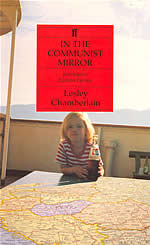 In the Communist Mirror
In the Communist Mirror
(Faber)
ISBN: 057114165X
The fascination with growing up in a divided Europe, with an ‘East’ and a ‘West’ both claiming to practise the good life, inspired these journeys through the countries at the heart of the post-war Soviet Bloc. After a year in Soviet Russia which acted as a springboard, and generated huge curiosity for the peoples wedged between the German and Russian giants, the author travelled to Poland, Czechoslovakia, Hungary, Romania, Bulgaria and East Germany in search of the true identity of those occupied cultures. Her ‘baggage’ included an education steeped in German and Russian literature and a fascination with the reactions of her young daughter, who came along on several of the trips. Looking long and hard in the Communist mirror produced the hope that a middle way could be found between Eastern and Western extremes to carry the European ideal forward.
Lesley Chamberlain writes: ‘I regretted that this book, finished in 1987, was not published until 1990, for by that time the world had changed and readers were easily led into believing this was a book about the revolutions of 1989 that ended Communism in Central and Eastern Europe. In fact these essays were a testament to how life was before anyone dreamt Communism was near to collapse. They are a historical document, providing evidence of what it felt like on both sides to live in a divided Europe.’
From the Reviews:
Lesley Chamberlain’s journeys seem very odd: impulsive, feckless, rather bedraggled forays into lands beyond the pale. Her interests are philosophical, literary, Freudian. Her book describes a series of love affairs with the countries she visited and with the men who symbolised them…she is a kind of East Bloc groupie, “a discontented Westerner dazzled by austerity”. Yet [she] determinedly persists in her folly, and, as a result, emerges into a kind of bemused wisdom…In the Communist Mirror is a subtle, delicate book and its modesty never quite disguises its originality.
Christopher Hope, The Independent on Sunday
Lesley Chamberlain, another woman who regularly went east in the mid-80s, has written an admirable and outstandingly honest book…the mirror has cracked from side to side since she finished her travels, yet events have increased the value of her insights into eastern European societies…Chamberlain’s travels are inner as well as geographical…she lays no claim to political nous, yet her explorations lead her far closer to the old east European independent activists’ contribution to radical politics than […] These are “not alienated”, she says; they synthesise poetry and politics. Why don’t British leftists write about eastern Europe as well as [Timothy Garton] Ash, [Lesley] Chamberlain or [David] Selbourne? Because they have been too embarrassed by the sheer fact of Soviet-type socialism to listen to east Europeans and learn from them.
Mark Thompson, City Limits
Lesley Chamberlain’s diary-style memoir – quite beautifully written – [describes] travelling in Eastern Europe in the early to mid Eighties when communism was still firmly in place. Now that the ideology has vanished the sensitive traveller and individualist – especially one like Lesley Chamberlain, with a conservative and romantic disposition – may feel a paradoxical sense of loss. For, while its monstrous form destroyed certain types of life, it protected others; guarded them from the onslaught of change and the drearier models of Western progress. Lesley Chamberlain’s discreetly erotic memoir is in its own way a work of conservation, of commemoration – imbued with the melancholy poetry which always comes from the contemplation of ruins.
Mark LeFanu, The Observer
1989
 The Food and Cooking of Eastern Europe
The Food and Cooking of Eastern Europe
(Penguin)
‘In The Food and Cooking of Eastern Europe … I matched my personal experience of food and cooking over there to the information I could find in classic Polish, Hungarian, Romanian and other cookbooks. I consulted these invaluable sources in the round reading room of the British Museum, the London Library and on my own shelves, with more or less difficulty. As an eminent Russian of my acquaintance, who had lived in London since he was a boy but retained his native language, used to claim, he could get by across a whole swathe of the European continent by employing ‘Basic Slav’, so now did I. With a knowledge of Russian and suitable dictionaries I confronted recipes in Polish, Czech, Slovenian, Serbo-Croat (as the official language of Yugoslavia was then known) and Bulgarian. My experience of Romance languages helped with Romanian. This was a shaky linguistic principle on which to proceed. My eminent acquaintance, instead of three return tickets from Prague to Kishinev, once found himself with six singles and a watermelon. All I can say is that friends and family were repeatedly invited to taste the results of my culinary-linguistic adventures and to advise on whether the pleasure of eating had been lost or found in translation.
‘I still cook from the many lovely recipes I collected up to a quarter of a century ago. Indeed they created my culinary style. Romania taught me to make my own tarama and supplied a much-loved recipe for chicken with apricots. Cholent, a gorgeous cassoulet-like concoction of beans and goose and barley, entered my repertoire from the Jewish kitchen. Stuffed aubergines and wonderful sticky cakes were borrowings for life from the Balkans, and ‘Ajvar’ stewed peppers, left whole and with just a shot of vinegar, regularly plunge visitors to my table into ecstasy. Bulgarian rice puddings, Fugger’s lemon cake from Warsaw, Serbian bean soup, soup with yoghurt and barley…I could go on. This is real food requiring the best, freshest ingredients, and, like all excellent cooking, it is best made lovingly at home.
‘When I encounter this book again as a book, rather than a collection of recipes, I see that it was at heart a diary devoted to my sensual response to travelling in mentally difficult places. To note through their food the pleasures and frustrations of millions of people not free to come and go across the world was intended as a gesture of sympathy, but which was in no way condescending. It was perfectly clear that a morally and materially satisfying life could be led without political freedom. And yet in the end my food travels also had the opposite political function, namely to celebrate diversity. I set out to look for differences from the ideological norm, from the standards of official institutions, and also for deviations from uninformed Western expectations. I wanted at home to make better known the ordinary daily lives of ‘faraway’ Europeans who had been propelled out of the common orbit. One has to remember how little cultural interest there was in points east during the Cold War years. This was especially the case in the Anglo-Saxon world.’
From the Introduction to the 1996 edition of
The Food and Cooking of Eastern Europe.
From the Reviews:
Lesley Chamberlain’s …magisterial Food and Cooking of Eastern Europe
Nigella Lawson, The Spectator
An excellent introduction to the cuisine of the lands of gulyas, dumplings and strudel.
Steven Beller, The Times Literary Supplement
The Food and Cooking of Eastern Europe is a tour-de-force of cuisines which often overlap but which have the same sturdy independence of spirit as the peoples who gave them birth.
Robert Heller High Life
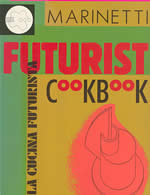 The Futurist Cookbook by F.P. Marinetti:
The Futurist Cookbook by F.P. Marinetti:
translated by Suzanne Brill,
edited and with an introduction by Lesley Chamberlain
(Trefoil London)
ISBN: 0862941407
The Italian Futurist poet, dramatist and publicist Filippo Tommaso Marinetti (1876-1944) compiled La Cucina futurista in 1932, some twenty years after he burst on to the European art scene with ‘The Futurist Manifesto’. A man who cultivated a public image as a deliberate troublemaker, Marinetti and his friends espoused speed and transience as the essence of modern art and life. Their Futurism dynamised and individualised Italian painting, while their cult of ‘the-word-in-liberty’, which pursued free associative expression without syntax, gave the world its first taste in literature of a Dadaism to come. Marinetti was way ahead of his time applying Futurist ideas to food, which meant treating ingredients primarily as a means of artistic expression and only incidentally as a source of nourishment. His revolutionary recipes include suggestions for themed restaurants, food performances and ‘staged’ meals. The twenty-first century is still catching up with his ideas.
Lesley Chamberlain writes: ‘This was the first time The Futurist Cookbook was available in English, thanks to Suzanne Brill’s translation, and although it was difficult to find a publisher brave enough to take it on, it appeared to great acclaim, thanks to the efforts of my editor, Conway Lloyd-Morgan. The Futurist Cookbook has since become a cult volume trading at a high price on its rarity value. Apart from introducing the reader to the art historical and political background, I based my introduction on working with Marinetti’s recipes, which proved an artistic revelation in itself. You have to see what his dishes look like on the plate to understand that these are paint-by-food instructions. As an Italian speaker I also worked on the English text to give it a genuine Futurist feel and Conway worked miracles with the design.’
From the Reviews:
There is a faint twinge of alarm in recalling that Futurism was to become the house style of Italian Fascism. Mussolini never followed Marinetti’s plans to the letter, although one can well imagine him setting up crack squads of ravioli hitmen and a League for the Liquidation of Noodles. Mostly, however, this book gurgles to the innocent sounds of excess pleasure.
Anthony Lane The Times
 The Food and Cooking of Russia
The Food and Cooking of Russia
(Penguin/Allen Lane)
‘Many things made it an exciting project… I wanted to… recapture the sights and sounds and smells of places I had visited in a Russia which, if it wasn’t timeless, was a place people lived in and not just a token in a political game. The result was I travelled as much as I could in my free time. (I still use the wonderful iron pans I bought in Georgia.) When I was in Moscow meanwhile I tried to shop in our often poorly stocked local shops and markets rather than the opulent grocery store reserved for foreigners. Of course I often succumbed to convenience. I piled my trolley high with luxury goods behind shuttered windows and like many of my Western press colleagues felt ashamed. ‘Ordinary’ Russians, whose lives were blighted by constant consumer shortages and daily queues, knew exactly what was going on. We should have shown solidarity. My slender excuse was that I needed ingredients to try out my recipes and I just couldn’t find them anywhere else. I had the feeling I was helping to keep alive a culinary tradition which was in danger of disappearing. It was an unusual cause to adopt, not a great one in human terms, but it gave me a way of writing about, and finding readers interested in, a real Russia. Lives in which no one had time to cook and so many ingredients were unobtainable were one real outcome of the inefficient command economy. I could at least draw attention to the way Communist ideology tried to conceal this this lapse by dismissing the culinary art as a bourgeois fetish.’
From the Introduction to the new edition of
The Food and Cooking of Russia
published by The University of Nebraska Press 2006.
From the Reviews:
The first really good book on this fascinating subject …It is the first on its subject to take account of post-Revolutionary changes in Russian eating habits…It is also the first book I know that is written by a Russian-speaking non-Russian. Most books on Russian food are the work of nostalgia-inspired émigrés whose memories of the food…sometimes impart un unwarranted rosy colour to Grandmother’s borshch. One of the greatest virtues of Mrs Chamberlain’s book, which I read from cover to cover as one would a novel, is the great attention she pays to the culinary regions of the Soviet Union…I am prepared to believe her when she says, “Goergia has been most influential in improving the standards of Soviet Russian cooking, and has taken the place France used to occupy”.
Paul Levy, The Observer
Her disposition to examine cookery in relation to political philosophy and history…is reflected in many parts of her book; woven together with pleasing literary quotations and allusions, it turns what would have anyway been a good cookery book into something more. Those who like to keep the books of Elizabeth David and Jane Grigson by their bedsides as well as in their kitchens will appreciate its discursiveness.
Alan Davidson, The Times Literary Supplement
